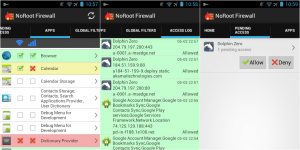Android Security: NoRoot Firewall
Do you ever worry that your mobile applications may be secretly or unnecessarily connecting to the Internet? Over the years, I have downloaded countless apps from the Google Play Store and found the vast majority of them accessing the Internet for reasons unrelated to their purpose or function. An instant messaging app, for example, can understandably require constant network access. But would you expect a simple calculator app to demand Internet access? Applications with unexplained Internet activity may drain shared network resources and negatively impact the performance of other apps. They could also cost you money by incurring data overage charges from your mobile carrier.
The most effective method of regaining control of your device’s Internet usage is to install an outbound firewall. This type of security software is nothing new — the concept of an outbound firewall was popularized many years ago on Windows PCs with products such as Kerio Personal Firewall and ZoneAlarm. It was only a matter of time before consumers wanted a similar kind of utility to safeguard their mobile devices.
There are two categories of firewalls available on the Android operating system: Those that require root access and those that don’t. Since gaining root access can mean voiding a device’s warranty, the ideal firewall application should provide the essential features of an outbound firewall without needing root access. A popular firewall that meets these requirements is NoRoot Firewall by Grey Shirts.

NoRoot Firewall uses Android’s built-in VPN functionality to force all network communications through its filter. The firewall launches upon device startup and pops up a notification whenever an application attempts to access the Internet. Only after the user approves the access request can the application connect successfully. NoRoot Firewall even supports custom rules to restrict network access down to the IP address level. Addresses on a whitelist are allowed access while addresses on a blacklist are blocked. Furthermore, filter rules can be designated as being applicable to just Wi-Fi connections, 3G connections, or both types of connections.
Some practical uses of NoRoot Firewall include stopping untrusted apps from “phoning home,” preventing unwanted automatic application updates, and blocking annoying advertisements. I have found an outbound firewall to be such an indispensable tool that it is one of the first apps I load onto newly purchased tablets. With manufacturer bloatware being the norm these days, I protect my privacy by installing NoRoot Firewall (via sideloading) before enabling Wi-Fi for the first time.
If you too wish to take back control of your device’s Internet access, consider giving NoRoot Firewall a place in your App Drawer.

















One thought on “Android Security: NoRoot Firewall”
I’m growing tired of Google allowing developers to gather our PERSONAL AND PRIVATE information without our direct knowledge and consent, and for the fact that EVERY app on the market does NOT need all these privileges! I think the United States government needs to get involved and sue Google, Apple, and Microsoft on a massive scale for PRIVACY INVASION!
Unlike other softwares, the vpn it creates is basically a placebo, far as i can tell it not call out to anyone.
But to be honest, everytime you sign something, in the real world, unless your a lawyer and understand what every single term and condition and sub clause means, you are basically giving your rights to freedom away more and more.
so why should the internet be any different?